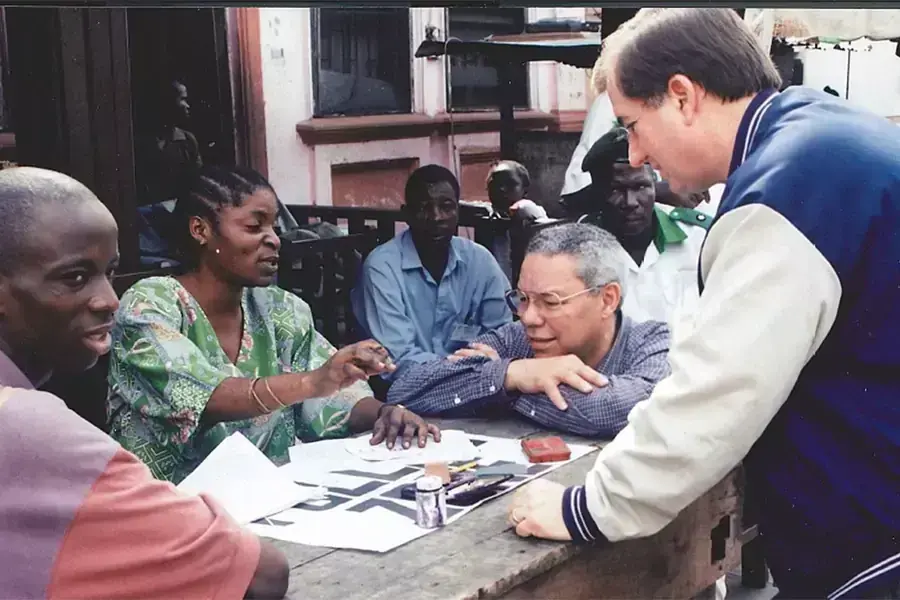Ed Royce, Champion of Africa in the U.S. House, Will not Run for Reelection

This is a guest blog post by Anthony Carroll. Anthony is founding director of Acorus Capital, a private equity fund investing in Africa, and a vice president of Manchester Trade Limited, an international business advisory firm. He has over forty years of experience working with Africa and is an adjunct professor at Johns Hopkins School of Advanced International Studies.
House Foreign Affairs Chairman Ed Royce’s unexpected announcement of his plans to retire from Congress has given us pause to reflect upon his African legacy. In my thirty-two years in Washington, I cannot think of any House member that has had such a broad and deep impact on Africa as Royce. There were many House members who championed discreet issues in Africa whether apartheid (Howard Wolpe), hunger (Mikey Leland), Sudan (Frank Wolfe), trade (Charlie Rangel, Jim McDermott, and Phil Crane) and human rights (Don Payne and Chris Smith) but none has had such broad impact .
More on:
Ed arrived in Congress in 1993 following a meteoric rise to political prominence representing his native Orange County in the California House. Among his initial committee assignments was to the prestigious House Foreign Affairs Committee (HFAC) where Chairman Ben Gilman asked him to chair the Africa subcommittee. In that post, Royce recognized the opportunity to bring focus to the oft-neglected continent and hired Tom Sheehy, an experienced Africanist (today Tom is staff director for HFAC).
Among Royce’s African accomplishments was as an original sponsor of the Africa Growth and Opportunity Act (AGOA). Congressmen Royce and Payne built an iron clad bipartisan coalition along with their Ways and Means Committee colleagues and pushed a reluctant Clinton Administration to eventually support the bill’s passage in 2000.
Payne and Royce, while of very different political stripes, also co-chaired the House United Nations Caucus. In 1998 Royce joined Speaker Newt Gingrich in awarding the Congressional Gold Medal to Nelson Mandela. The following year, Royce co-led an International Republican Institute (IRI) election observer team to Nigeria where he and Colin Powell cautioned the country’s powerful military to remain in the barracks and respect the results. Imperfect as it might be, Nigeria now enjoys a thriving democracy. While the House once again shifted to Democratic control and Royce moved from the Africa subcommittee chairmanship, he rallied skeptical Republicans to pass and fund the Millennium Challenge Corporation (MCC), which embodies Royce’s deep commitment to promoting the rule of law in Africa.
Royce was willing to travel to dangerous and obscure African destinations. Witnessing the carnage caused in Liberia and Sierra Leone by Charles Taylor, Royce joined with Ambassador Susan Rice in hounding Taylor until his arrest in 2006. Royce elevated attention on both Taylor’s misdeeds and our special relationship with Liberia, which next week will celebrate its first transition to a newly elected president. His work in clearing up the civil wars in Sierra Leone and Liberia gave momentum to the Kimberly Process, which helped lead to the demise of the blood diamond trade.
When he assumed the HFAC chair five years ago, Royce crafted a deep bipartisan leadership model with the Committee’s ranking member Eliot Engel. Not since Lee Hamilton have we seen a Chairman exhibit such leadership. Royce maintained support for the agencies to which he provided oversight including Peace Corps, USAID, and OPIC, and he pushed the State Department to establish an effective inspector general. Certainly, Iran, Russia, and North Korea commanded the headlines but Royce never left Africa behind. He led the renewal of AGOA, sponsored legislation expanding U.S. assistance to develop Africa’s power supply, and thwarted the poaching of African wildlife and the illicit trade of its bounty.
More on:
Royce has always been driven by a desire to do the right thing and not let partisan politics or special interests get in the way. Indeed, there were few votes in Orange County that were swayed by African issues. He has been relentless in explaining the importance of Africa to his fellow members of Congress. Royce’s departure will not only be a loss for Africa’s presence in Washington but also for the long cherished notion that partisan politics ends at the American shoreline. Safari njema Mzee Royce.
 Online Store
Online Store